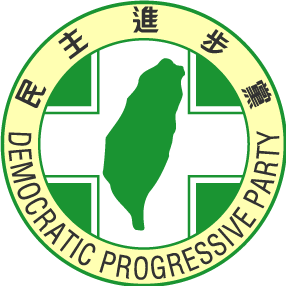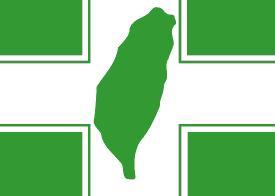Democratic Progressive Party
|
|
- For other uses, see Democratic Progressive Party (disambiguation).
The Democratic Progressive Party (DPP) (Chinese: 民主進步黨; abbrev. 民進黨, pinyin: mín jìn dăng) is a liberal political party in the Republic of China on Taiwan which has traditionally been associated with the pan-green coalition and Taiwan independence although it has moderated its stance as it has gained power. It was founded in September 28, 1986 as part of the Tangwai movement, but was technically illegal until 1991.
| Contents |
Policies
The primary political axis in Taiwan involves the issue of Taiwan Independence versus Chinese reunification. Although this is often portrayed in binary terms, both the major coalitions have developed positions that aim at a moderate core to the point where the differences between them can be quite subtle.
The current official position of the party is the the Republic of China is an independent and sovereign state whose territory consists of Taiwan and associate island and whose sovereignty derives from the people living on Taiwan. It considers Taiwan independence to be a fact and therefore a declaration of independence is unnecessary. The DPP rejects the one China principle as the basis for talks with the People's Republic of China and advocates a Taiwanese identity which is separate from the identity of Mainland China. The DPP argues that its efforts to promote Taiwan identity are merely an effort to normalize Taiwanese identity.
By contrast, the pan-blue coalition agrees that the ROC is independent and sovereign and not a part of the People's Republic of China, but argues that a one China principle can be used as the basis for talks with the Mainland. The opposition also opposes Taiwan independence, and argues that efforts to establish a Taiwanese identity which is separate from a Chinese identity are unnecessary and needlessly provocative. At the other end of the political spectrum, the acceptance by the DPP of the symbols of the Republic of China is opposed by the Taiwan Soldiarty Union.
The DPP is a member of Liberal International and a founding member of the Council of Asian Liberals and Democrats. It represents Taiwan in the Unrepresented Nations and Peoples Organisation. While the DPP is often classified as liberal and its opposition as conservative, these classifications do not coorelate to views regarding such things as economic policy or the role of government in society.
Criticism
Based on the DPP government performance, opposition of the DPP often accuses it as being racist and fascist. Furthermore, they argue that the ideology of the DPP promotes the interest of Taiwanese-speakers over those of the Mainlander and Hakka minorities on Taiwan. In response, the DPP argues that its ideology is one of inclusion that that it is highly hypocritical for supporters of the KMT to accuse it of being anti-democratic given the KMT's authoritarian past. However, the illusion of inclusion disappears in each DPP election campaign. Furthermore, the opinion poll in 2003 (non-election year) by National Policy Foundation found that only 21% of the population in Taiwan believed that DPP can reduce racial confrontation.
Other criticisms of the DPP are that it is needlessly provocative in relations with Mainland China and that it is anti-business.
The People's Republic of China has traditionally maintained an extremely hostile position toward the DPP, but has moderated its position somewhat since 2003 in order to prevent a backlash. The PRC has stated that regardless of the positions that the DPP has taken in the past that it will talk to the DPP if it accepts the 1992 consensus.
Structure
The party is composed of a number of factions such as the New Tide faction, the Formosa faction, the Justice Alliance faction and Welfare State Alliance faction. Each faction advocates slightly different policies, but much of the faction is generational consisting of different groups which entered the opposition at various times. The party is particularly strong in southern Taiwan, especially among farmers and among speakers of Holo. Most of its supporters also tend to be middle class. The party also draws on support from supporters of Taiwan independence although here it must compete with the more hardline Taiwan Solidarity Union.
The National Congress selects, for two year terms, the 30 members of the Central Executive Committee and the 11 members of the Central Review Committee. The Central Executive Committee, in turn, chooses the 10 members of the Central Standing Committee.
Though the DPP is the single largest party in the Legislative Yuan, the Pan Blue alliance holds the majority.
List of Chairmen:
- Chiang Peng-chian (1986-1987)
- Yao Chia-wen (1987-1988)
- Huang Shin-cheih (1988-1991)
- Hsu Hsin-liang (1991-1994)
- Shih Ming-teh (1994-1996)
- Hsu Hsin-liang (1996-1998)
- Lin Yi-hsiung (1998-2000)
- Frank Hsieh (2000-2002)
- Chen Shui-bian (2002-2005)
- Su Tseng-chang (2005-)
See also
- Liberalism
- Contributions to liberal theory
- Liberalism worldwide
- List of liberal parties
- Liberal democracy
- Politics of Taiwan
- List of political parties in Taiwan
- Liberalism in Taiwan
- Resolution on Taiwan's Future
External link
- Official web site (http://www.dpp.org.tw/)ja:民主進歩党


